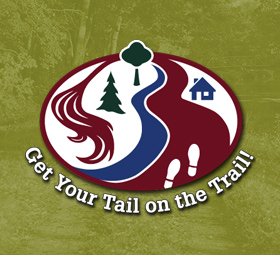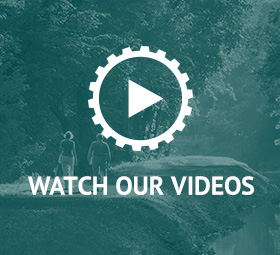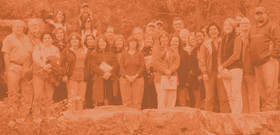The D&L Blog

Post by: Lauren Drabenstott, D&L Marketing Intern
As our last blog post details, Cindy Dunn, Secretary of the Pennsylvania Department of Conservation and Natural Resources (DCNR) visited Hugh Moore Park. I was lucky enough to sit down with her for a short interview to discuss our involvement with DCNR, the significance of National Heritage Areas, and some of the best parks around Pennsylvania.
Q: What are your responsibilities as the secretary of DCNR?
A: As the secretary of DCNR, I oversee and manage the state parks, the state forest land, our conservation and recreation grants program, and our topographic and geographic services. We work in conjunction and partnership with a lot of external partners like the Delaware & Lehigh. We have the Heritage Area program.
Pennsylvania is one of the states with the most National Heritage Areas, which I think reflects our deep cultural and industrial heritage in the Commonwealth. A lot of Pennsylvanians are like me – my grandfather worked in a steel mill, my great-great-great grandfather operated a canal boat. On the other side of my family, there were farmers.
We also have one of the best state park systems – 121 state parks. We have one of the biggest conservation grants programs, and not every state has something like that. The citizens of Pennsylvania have chosen again and again to support funding for land conservation, recreation, and heritage areas.
Q: Everyone who works in conservation and in the environment has been inspired by different things. Why did you choose to get involved? How did you end up where you are?
A: For me, it was almost a forgone conclusion. My father worked in the old Forest and Waters, which is a predecessor of DCNR. As a kid, he would take us camping in the state parks, or we’d run out on the weekend to check out one of his projects, or go on trails. So for me there was really never anything else, no competing interest. But a particular subset of that for me is connecting people to nature. If you don’t deliberately provide opportunities for people, they get disconnected from nature. Parks, trails, programs, access, and direct outreach are so important because without that connection to nature, I just feel people’s lives aren’t as enriched.
Q: Pennsylvania has a history of extraction – coal, fracking, even oil. How does that affect the culture surrounding conservation? The kind of policies that DCNR focuses on?
A: As a direct result of Pennsylvania’s coal mining history, the rivers and lands of Pennsylvania were really ravaged. It was frankly the Susquehanna River’s pollution that galvanized a House of Representatives member to propose Pennsylvania’s environmental rights amendment. Pennsylvania is one of the few states with a constitutional amendment. It stands there equal with free speech, right to gather, and other major constitutional rights: the right to clean environment, including the historical, aesthetic, and cultural stuff.
DCNR really came out of the ashes of the decimation of the state forests. By the late 1800s and early 1900s, Pennsylvania was almost completely deforested. It was really from this that the forestry movement began in Pennsylvania. From the devastation really has come commitment to improvement, but there’s still always a push-pull on the policy side of any extractive industry. Pennsylvania has continued to grapple with it, and it is reflected in conversations of today. The same fights that we had a hundred years ago are still playing out.
Q: What are the most important policies to focus on right now – water, forest management, endangered species, etc.?
A: Based on the natural gas development that really came on so rapidly in ’08 and ’09, [one of the most important is] that some of the state forest land was leased for gas development. It’s part of the purpose of the state forests, but it came on so fast. This governor was willing to issue a moratorium on additional public land gas leasing, so that gives us a kind of protection. It’s an executive order, so it won’t be there forever, but it’s given DCNR a chance to put the brakes on additional leasing.
[The majority of the public] sees public land as a place that should not be overdeveloped for extractive purposes. Even though the gas leases are already there, we’re getting better at managing them. We’re learning over time how to do things better.
Q: What do you think is the most underrated environmental issue that deserves more attention?
A: People don’t realize things we take for granted – the water we drink, the air we breathe, the public land we enjoy. A lot of the public doesn’t realize that it’s only there because of civic engagement of citizens. Without citizens demanding it, government doesn’t provide it. I think all of the environmental policies are underrated. [Things] will backslide pretty quickly without protection, so everything takes constant support. Our state parks system, if DCNR were ever defunded, would fall apart. The parks that people enjoy and take for granted wouldn’t be available.
Q: On the DCNR website, it says that you enjoy outdoor activities like canoeing and hiking. What are some of your favorite state parks to hike at? To canoe at?
A: I like hiking the Lehigh Gorge, and biking that. I enjoy my local park that I go to a lot, Pine Grove Furnace State Park. The Appalachian Trail comes through it, so I hit that. I go to Pinchot Lake near where I live for paddling because it’s bigger. Out here [in the Lehigh Valley], places like Beltzville provide a lot of good opportunities. I really enjoy Hickory Run – the boulder field is very cool.
The trouble is, every time I think of a park, it’s “I like that one, I like that one!” There was a saying that one of my successors had that his favorite park was the park he was in. That’s a good way to look at it. The key is just taking the time and getting out.
Q: How does the work that you do at DCNR coincide with the kind of work the D&L does?
A: DCNR was actually created with a founding principle in our creation legislation of working in partnership – because the mission we have is only possible through partnerships. The D&L is a primary partnership for us. Not only is the D&L a Heritage Area, but they operate and manage this museum. They are partners with us on Delaware Canal State Park and Lehigh Gorge. They provide a cohesive program to finish the D&L Trail — when the D&L is finished, 165 miles of continuous trail, that’ll be the largest rail trail in Pennsylvania. We know the economic and health values that it’ll bring to all the communities that it connects. So we’re pretty excited… we have a lot of partners, but the D&L really stands out as one of our strongest.
It was a pleasure chatting with Secretary Dunn. We at the D&L appreciate our partnership with DCNR and everything the staff does for the entirety of Pennsylvania!









